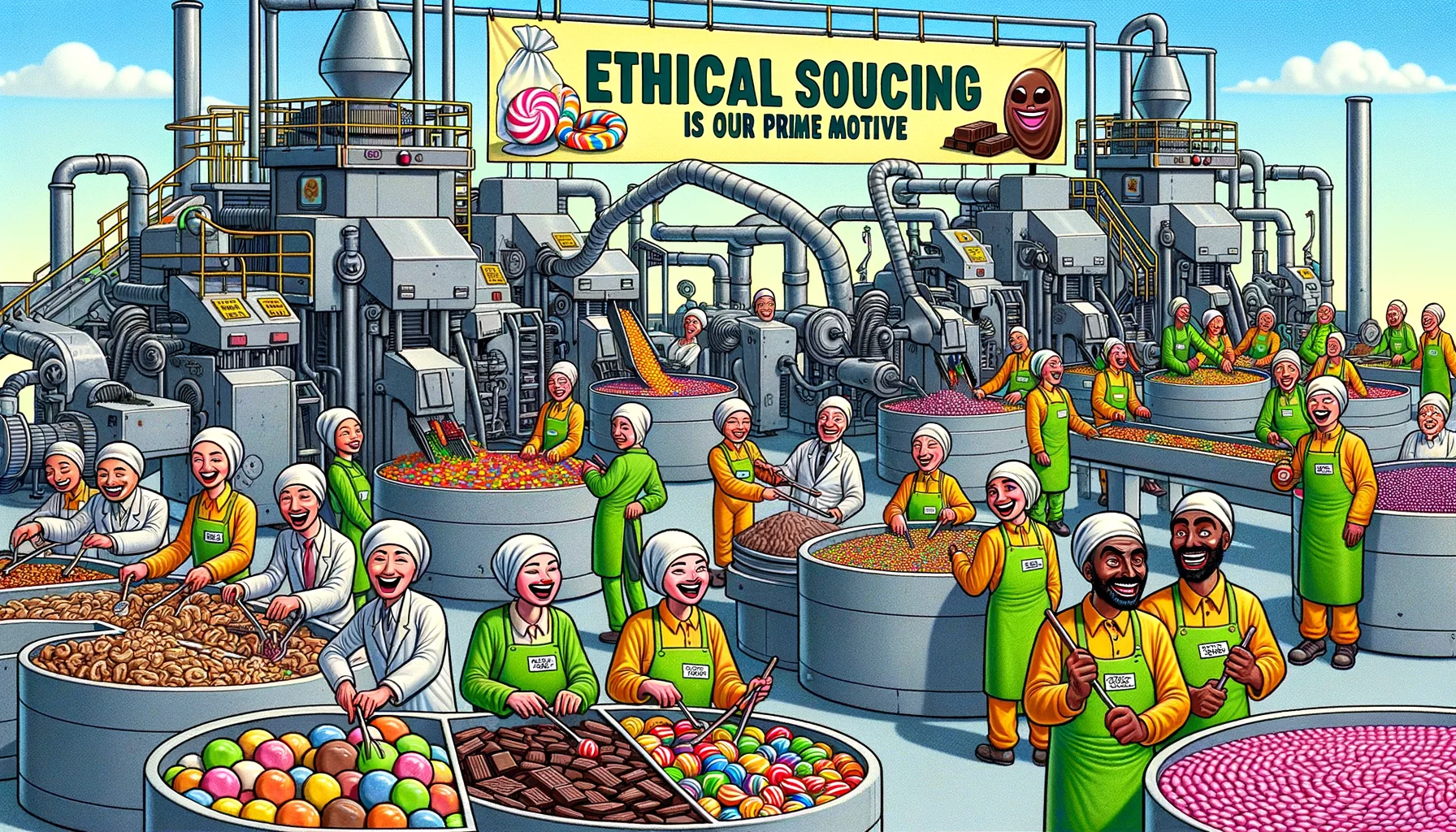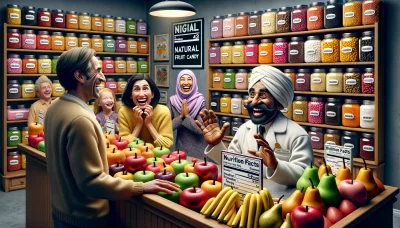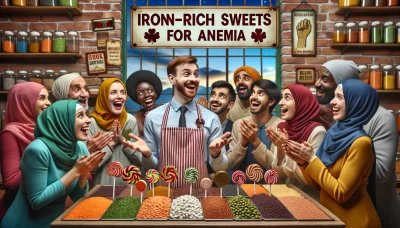Ethical Sourcing in Candy Production Quiz
Test Your Knowledge
Question of
Understanding Ethical Sourcing in Candy Production
Definition of Ethical Sourcing
Have you ever unwrapped a piece of candy and paused to ponder where it came from? Ethical sourcing is like the secret ingredient that doesn't get listed on the package, but it's crucial. It's about ensuring that the products we enjoy are created in a way that respects the environment and the people involved in its production. It's like giving back to the world with every bite we take.
When I first heard about ethical sourcing, I imagined farmers smiling as they harvested cocoa beans under the warm sun. It's a practice rooted in fairness, safety, and sustainability. It ensures that workers receive fair wages, have safe working conditions, and are treated with dignity. The ripple effect is powerful it can transform communities and preserve ecosystems.
And while it might seem like a modern concept, ethical sourcing has deep roots. Its origins can be traced back to when traders began to recognize the value of fair exchanges. Over time, it has evolved into a structured approach defined by international standards and certifications, such as Fair Trade and Rainforest Alliance.
Key Principles
The key principles of ethical sourcing are like the compass that guides candy producers through the complex maze of global trade. Transparency is paramount it's not just about knowing where ingredients come from, but also how they were grown and who was involved in their production. There's also accountability; companies must own their impact on communities and environments.
Another vital principle is equity. Imagine a world where every worker in the candy supply chain can look forward to prosperity because they're paid fairly for their labor. And let's not forget about environmental stewardship protecting the planet so future generations can enjoy sweet treats just as much as we do today.
Industry Standards
- Fair Trade Certification: Ensuring farmers get a fair shake for their hard work.
- Rainforest Alliance Certification: A green thumbs-up for biodiversity-friendly practices.
- UTZ Certification: It's all about sustainable farming and better opportunities for farmers.
- Organic Certification: Keeping things natural without synthetic pesticides or fertilizers.
Importance in the Candy Industry
The importance of ethical sourcing in candy production cannot be overstated. It's like choosing between a treat that tastes good and one that does good luckily, with ethical sourcing, you can have both! Consumers are more informed than ever before; they're like detectives examining labels for clues about whats inside their food. They want transparency and integrity, not just empty calories.
A brands reputation is as delicate as a spun sugar sculpture; it takes ages to build but can crack in an instant if consumers lose trust. Brands embracing ethical sourcing become beacons of hope in an industry often criticized for its impact on society and nature. They stand out like rare gems amidst stones, shining brightly with their commitment to doing right by people and the planet.
In terms of long-term sustainability, think of ethical sourcing as planting seeds for future forests rather than just picking apples for today's pie. It ensures that candy production can continue for generations without depleting resources or exploiting workers creating a legacy sweeter than any confectionery could ever be.
Challenges in Implementing Ethical Practices
The path to ethical sourcing is paved with good intentions but also lined with hurdles. Identifying suppliers who share your values is akin to finding a needle in a haystack it requires diligence, patience, and sometimes a leap of faith. Companies must navigate through murky waters where claims of sustainability are plentiful but concrete evidence is scarce.
The cost implications can also be daunting; let's face it - doing things right often comes with a price tag heavier than a giant jawbreaker. But consider this an investment rather than an expense; one that pays dividends through customer loyalty and brand strength.
Lastly, regulatory compliance can be as complex as the most intricate chocolate mold. Laws vary across borders like flavors in a candy shop each unique and requiring careful attention. Staying compliant means staying informed and agile enough to adapt when regulations shift like sands in an hourglass.
Key Ingredients in Candy and Their Ethical Concerns
Ah, candy a confection that dances on the tongue and delights the senses. But behind each delectable bite lies a story, one that often begins in the far reaches of our planet. As I've come to appreciate both the sweetness of life and the importance of ethical choices, I've delved into the origins of these key ingredients in candy production. It's a journey that's as rich and complex as the finest chocolate truffle.
The conundrum we face with something as innocent as a sugar rush is tied to profound ethical concerns. From sugar cane fields to cocoa plantations, the path to our pantries isn't always paved with good intentions. Each ingredient whispers tales of labor and environmental impacts that are too important to ignore. It's not just about satisfying a sweet tooth; it's about being mindful of where that sweetness comes from.
Indulging in these treats is more than a momentary pleasure; it's an opportunity for self-discovery and empowerment. By unraveling the stories behind these ingredients, we can make informed choices that contribute to our happiness and align with our values. Let's unwrap this further and explore what lies beneath the shiny wrappers of our favorite candies.
Sugar Cane and Beet Farming
Sugar, oh honey honey it's not all sweet when it comes to sugar cane and beet farming. The sticky situation here revolves around labor rights issues that are hard to digest. Harsh working conditions, unfair wages, and even child labor can tarnish the sparkle on those sugar crystals.
Then there's the environmental impact sugar farming isn't always a piece of cake for Mother Earth. Water-intensive cultivation practices drain local resources, while chemical runoff from farms can lead to soil degradation and biodiversity loss. It feels like a sour patch in an otherwise sweet world.
- Fair Trade Options: Thankfully, some rays of hope shine through with fair trade sugar options.
- Empowering Farmers: Fair trade initiatives work towards empowering farmers with fairer wages and better working conditions.
- Environmental Stewardship: They also promote sustainable farming practices that help safeguard our planet's health.
Cocoa Production
Cocoa the heartthrob of chocolate lovers everywhere has its own shadows lurking behind its velvety darkness. Child labor and exploitation cast long, bitter shadows over cocoa production, making each bar bittersweet when you think about the hands that harvested it.
But let me sprinkle some good news on top! Shade-grown cocoa benefits not just your taste buds but also the environment. These agroforestry systems provide a canopy for wildlife, creating a harmonious balance between agriculture and natures needs.
Certification programs like Rainforest Alliance and Fairtrade swoop in like caped heroes, ensuring ethical standards are met. They offer us peace of mind with each indulgent bite, knowing we're supporting sustainable practices that value human life and ecological balance.
Nuts and Other Additives
Crunchy nuts add texture to our treats, but let's not gloss over their own ethical crunch. Biodiversity preservation is at stake when vast monocultures displace diverse ecosystems for nut production.
Water usage is another nutty issue; almonds especially are thirsty little morsels requiring gallons upon gallons just for a single nut! We're talking about serious conservation considerations if we want our snacking habits not to leave the planet parched.
When we support local communities by choosing ethically sourced nuts, we're doing more than just munching responsibly; we're contributing to livelihoods. Its empowering to know that with every conscientious nibble, were part of a global movement towards sustainability.
Certifications and Labels to Look For
There's something almost magical about unwrapping a piece of candy. The crinkle of the wrapper, the sweet scent that meets your nose, the anticipation of that first delightful bite. But beneath the surface of this simple pleasure, there's a story - one that affects lives, ecosystems, and communities around the world. It's the story of how that candy came to be in your hands, and increasingly, it's a story we're all becoming a part of through our choices and preferences for ethically sourced treats.
Ethical sourcing in candy production isn't just a buzzword; it's about real impact, about ensuring that indulgence isn't at the expense of others. When I first discovered the significance of certifications like Fair Trade and Rainforest Alliance, it was as if I had uncovered another layer of enjoyment in my confectionery delights. Knowing that my choice could contribute to positive change added an extra sweetness that no amount of sugar could provide.
Let's unwrap these certifications together, shall we? Let's explore what they really mean for those who produce our candies and for us, the consumers who can drive change with every delicious bite.
Fair Trade Certification
- Criteria for Certification: Fair Trade Certification acts like a guardian angel for ethical practices in candy production. To be certified, companies must adhere to strict standards that ensure safe working conditions, fair compensation, and community development funds. It's like a promise wrapped in every piece of candy - a promise of dignity and respect for those who crafted it.
- Impact on Farmers: Imagine being a cocoa farmer, working tirelessly under the sun only to be paid pennies. Fair Trade changes this narrative by securing better prices and terms for farmers and workers. It empowers them to improve their lives and invest in their communities. Each time I savor a Fair Trade chocolate bar, I feel connected to these farmers' stories it's bittersweet in all the right ways.
- Recognizing Certified Products: Spotting Fair Trade Certified products is like finding little badges of honor on your candy wrappers. Look for the distinctive logo it stands out as a beacon of ethical commitment. Choosing these products feels like joining an alliance; an alliance for fairness in the bountiful world of sweets.
Rainforest Alliance Certification
Now let me take you into the lush forests where another kind of commitment is taking root one that ensures our treats don't lead to deforestation or habitat destruction. The Rainforest Alliance Certification is like an emerald crown atop our candies, signifying adherence to comprehensive sustainable practices.
As someone who adores nature almost as much as candy, learning about this certification felt like uncovering a hidden gem within my snack drawer. It reassures me that with every bite I'm supporting initiatives that help preserve our planets precious resources.
Sustainable Farming Practices
These certified candies are ambassadors for sustainable agriculture encouraging reduced pesticide use, soil conservation methods, and overall farm management improvements that benefit both people and nature. As we indulge in these treats, we're also nurturing the earth they sprung from.
Wildlife Protection
The Rainforest Alliance goes beyond farming; it extends its protective wings over wild creatures too. When you choose candies with this certification, you're helping safeguard habitats so that every fluttering butterfly and chattering monkey can thrive alongside our sugary cravings.
Climate Change Mitigation
In todays climate (pun intended!), eating candy can be climate-conscious too! This certification supports farming practices aimed at reducing greenhouse gas emissions every treat becomes an ally against climate change.
Organic Labels
Avoidance of Synthetic Pesticides
When you think organic candies, think clean fields where crops grow free from synthetic pesticideslike little oases where sugarcane and cocoa beans flourish naturally. It's not just about absence but presencethe presence of practices that foster biodiversity and ecological balance.
Soil Health and Crop Rotation
The soil is more than just dirt; its alivea complex tapestry woven with organisms essential to our food system. Organic labels assure us that the ground where candy ingredients are grown is treated as sacred ground through crop rotation and organic fertilizerscandy-making becomes an act of reverence for Mother Earth.
Non-GMO Verification
In an age where genetic modification has become widespread, organic labels stand as guardians at the gatesensuring that what grows is as nature intended. Every non-GMO verified sweet represents a choice for natural heritage over laboratory legacya true gift from natures bounty.
Ethical Sourcing and Consumer Choices
As I sit here, unwrapping a piece of chocolate, there's a sense of anticipation that's almost palpable. The rich aroma wafts up to greet me, promising a moment of bliss. But this isn't just any chocolate; it's one that whispers tales of forests and fields where equity and respect are as crucial as the soil itself. Ethical sourcing in candy production isn't merely a buzzwordit's about connecting with the story behind each sweet treat, knowing that with every bite, you're part of a narrative much larger than yourself.
The journey towards ethical indulgence is like peeling back the layers of a trufflecomplex and nuanced. It starts with understanding the power we hold in our hands, not just in the form of confections but in the choices we make when selecting them. Ethical sourcing ensures that the ingredients are harvested responsibly, workers are treated fairly, and sustainable practices are upheld. It's about savoring sweetness without the bitter aftertaste of exploitation.
When I think about the impact my choices have on communities around the world, it instills in me a profound sense of responsibility. There's something incredibly empowering about knowing that each time I choose an ethically sourced candy, I am casting a vote for the world I want to live ina world where sweetness is shared and savored by all.
Educating Consumers on Ethical Choices
Education is like unwrapping a candy barthere's always something new to discover beneath the surface. Transparency in sourcing has become increasingly important for consumers who seek to understand where their food comes from. It's about shining a light on the journey from farm to wrapper so that each step aligns with our values. Companies now realize that informed consumers are empowered consumers, and they're responding by providing more information about their ethical practices.
Label reading has become an art form for those of us keen on supporting ethical sourcing. We've learned to decipher the hieroglyphics of certifications and claims, understanding that labels like 'Fair Trade' or 'Rainforest Alliance Certified' are more than just decorativethey're signposts guiding us towards conscious consumption. But it goes beyond just reading; it's about understanding what these labels truly represent and how they reflect on the company's commitment to ethical practices.
The power of consumer demand is akin to a river carving its way through rockit might take time, but it can reshape landscapes. As consumers demand more ethically sourced candies, companies listen. Our choices have ripple effects that travel up the supply chain, encouraging better practices and ultimately leading to positive change across entire industries.
How to Identify Ethically Sourced Candy
Identifying ethically sourced candy can sometimes feel like navigating through a mazeit requires attention and intentionality. One way is by examining company policies and commitments. Many companies now outline their dedication to ethical sourcing on their websites or packaging; they share stories of partnerships with local communities or describe initiatives to reduce environmental impact.
Ingredient traceability is another key factor in identifying ethically sourced treats. When companies provide information about where their ingredients come from, it adds layers of accountability and assurance for us as consumers. We can practically taste the transparency when we know that our chocolate bar contains cocoa from farms practicing sustainable agriculture.
- Packaging Claims: Looking for specific labels such as Fair Trade or Direct Trade certifications can be indicative of ethical sourcing practices.
- Validations: Third-party validations by organizations ensure credibility; they act as referees in a game where fairness is paramount.
- Sustainability Reports: Some companies provide detailed reports on their environmental impact and social initiativesthese documents offer insight into their commitment levels.
The Impact of Consumer Advocacy
The impact of consumer advocacy in promoting ethical sourcing is akin to biting into a perfectly tempered piece of chocolatethe satisfaction runs deep. Success stories abound where collective consumer pressure has led to significant changes within companies who initially turned a blind eye towards unethical practices. These victories aren't just sweet; they're monumental landmarks in our journey towards a more equitable industry.
I've witnessed grassroots movements grow from tiny seeds into bountiful gardens of change. Campaigns organized by passionate individuals have blossomed into community-wide efforts that hold companies accountable for their actionsor lack thereofand push for greater transparency and responsibility in candy production.
Leveraging social media has become an essential tool for raising awareness about ethical sourcing. Each post or tweet acts like an echo through cyberspace, amplifying messages that might otherwise go unheard. Social media has empowered us to create waves of change right from our screens; we've seen it transform consumer awareness into tangible action that sweetens the deal for everyone involvedfrom farmer to consumer.
The Role of Companies in Promoting Ethical Sourcing
When I bite into a piece of chocolate, there's more than just cocoa and sugar melting on my tongue. There's a story - one that often starts far away with farmers and communities whose livelihoods depend on the ethical decisions made by the companies we support. It's the taste of responsibility, the flavor of social consciousness that makes indulging in sweets all the sweeter. Companies today are increasingly aware that their role extends beyond profit-making; it involves nurturing a supply chain that is as pure and unblemished as the confectionaries they produce.
Every time I unwrap a candy bar, I think about the hands that have made it possible. It's not just about satisfying my sweet tooth; it's about supporting a system that values human dignity and environmental sustainability. The journey from bean to bar has many layers, each requiring attention and care. For me, knowing that a company is committed to ethical sourcing adds a richness to their treats that no amount of sugar can match.
Corporate Responsibility Initiatives
Supplier Code of Conduct : Companies are drafting these moral compasses with greater detail than ever before. It's like a recipe for fairness, specifying exactly what ingredients - in terms of labor rights and eco-friendly practices - must go into every business transaction. Every time we choose such ethically sourced candies, it's as if we're endorsing this recipe, affirming our collective appetite for justice.
Auditing and Compliance Checks : These are the taste tests for integrity in the production process. Just as one would scrutinize the quality of cocoa or the freshness of nuts in a chocolate bar, companies now examine their supply chains with an eagle eye to ensure everything is up to ethical standards. And when they pass these tests? Oh, the sweetness multiplies, knowing that our indulgence hasn't come at someone else's expense.
Community Engagement Programs : There's something special about enjoying a treat that gives back to those who created it. Many companies are weaving themselves into the fabric of farming communities through various initiatives designed to improve lives and land. These aren't mere charitable acts; they're ingredients for a sustainable future - both for people and for palates.
Collaboration with NGOs and Governments
Partnerships for Sustainable Development Goals (SDGs) : When chocolate companies join forces with NGOs and governments, it's like creating an alliance of superheroes for social good. They work together towards achieving SDGs such as ending poverty and hunger which is quite fitting because isn't chocolate supposed to save the day?
Policy Advocacy for Fair Trade Practices : It feels empowering to know that your favorite treat not only tickles your taste buds but also stands up for fair play in trade policies. As companies lobby for equitable trading conditions, they're ensuring that every layer of nougat or caramel comes with a dollop of dignity for producers around the world.
- Joint Projects with Local Communities : This isn't just about planting cacao trees or building schools; it's about cultivating hope and harvesting dreams alongside crops. With projects rooted in community development, these partnerships become as essential to candy production as sugar itself maybe even more so.
Innovations in Supply Chain Transparency
Blockchain for Traceability : Imagine being able to follow your chocolate bar on its journey from seedling to shelf. Blockchain technology promises such transparency, offering a ledger more delectable than any list of ingredients because it details every ethical checkpoint along the way.
Digital Platforms for Farmer Support : In this digital age where information is at our fingertips, companies are creating platforms where farmers can access data on best practices, market trends, or even weather forecasts. It's like giving them a crystal ball so they can grow cacao beans as magical as Jack's beanstalk beans that lead not to giants but to giant strides in sustainable farming.
I'm convinced that every investment in sustainable technologies sprinkles added joy upon our confections. After all, what's better than enjoying your favorite candy? Knowing that it came from a place where innovation meets compassion now thats sweet progress!
The Economic Impact of Ethical Sourcing on the Global Market
Oh, how the world of sweets has evolved from the simple candy canes hanging off Christmas trees to a global industry with a conscience. As I sit here, unwrapping a piece of chocolate that boasts 'ethically sourced' on its vibrant wrapper, I can't help but ponder the economic waves this little treat is making across the globe. You see, ethical sourcing in candy production isn't just about satisfying our sweet tooth; it's about creating a ripple effect that touches lives and economies far and wide.
When we talk about ethical sourcing, we're spinning a tale of social responsibility, environmental stewardship, and yes, economics. It's like biting into a luscious piece of dark chocolate and realizing there's an aftertaste of empowerment and sustainability that lingers on your palate. The impact stretches from the cocoa farms to our shopping carts, influencing market dynamics in ways that are both subtle and profound.
It's a narrative woven with threads of fairness and equity, where every nibble of nougat tells a story of change. But what happens when these high-minded principles meet the hard reality of market forces? Let's unwrap this confectionery conundrum together and taste the complexities hidden within.
Price Premiums and Market Demand
Sometimes I imagine ethical sourcing as this rich caramel centersweet and satisfyingknowing that my indulgence supports something positive. But let's face it: quality ingredients come with a price tag. Ethical sourcing often means paying more to ensure farmers get their fair share, leading to price premiums on our end. Yet despite this, consumers are increasingly willing to reach for treats that promise no bitter aftertaste of exploitation.
As I savor the smooth texture melting on my tongue, I think about how our willingness to pay extra for ethically sourced products speaks volumes about our values. We're not just buying candy; we're buying into an ideaa vision for a better world wrapped up in foil packaging. And this shift is shaping market trends as consumer behavior leans towards brands with strong ethical credentials.
This isn't just fluffy marshmallow talk; it's real. Brands that stand on the platform of ethics gain a competitive advantage in today's market. They become not just purveyors of sugary delights but beacons of hopelighthouses guiding us toward a future where indulgence doesn't come at someone else's expense. It makes you wonder if maybe, just maybe, doing good can also mean doing well.
Investment in Sustainable Agriculture
- Funding for Farmer Education
- Infrastructure Development in Rural Areas
- Crop Diversification and Resilience
We often forget that behind every ethically sourced sweet is an entire ecosystem supporting sustainable agriculture. Just like adding layers to a jawbreaker, investing in education for farmers adds depth to their expertiseempowering them to cultivate their lands more effectively and sustainably.
Moreover, when we invest in infrastructure development in rural areas where these tasty treats originate, we're not just paving roadswe're paving pathways to progress. This means better access to markets, improved technologies, and ultimately stronger communities capable of standing tall like sugar cane fields against the winds of adversity.
And let's not overlook crop diversification! Just like having an assortment of gummies is always better than just one kind (who could ever choose between raspberry or lime?), diversifying crops ensures resilience against changing climates and market demands. It brings stability to farmers' incomesthe kind that allows them to plan for the future rather than just scraping by.
Long-term Benefits for the Economy
Dive into any candy bowl filled with ethically sourced goodies and you'll find more than just confectionsyou'll find kernels of hope for long-term economic benefits. These treats are part of a movement that creates jobs and reduces poverty by offering stable income sources for those who need them most.
Ethical sourcing is like planting seeds for healthier ecosystems; it nurtures biodiversity instead of stripping it away for monoculture crops. This approach ensures food securitynot only for those cultivating cacao but also for generations to come who will continue to harvest its sweet bounty under sun-dappled skies.
Finally, consider how ethical sourcing contributes to stability in commodity prices. It's akin to finding balance in a recipetoo much sugar can overwhelm but get it just right, and you've got harmony in every bite. By investing in fair practices today, we might avoid the bitter taste of volatility tomorrowa sweetness worth savoring indeed.
Future Directions in Ethical Candy Production
Innovations in Sustainable Farming
The whispers of the earth are heard in the rustling leaves of cacao trees, where the future of candy production is being reshaped. It's a tale that speaks of soil and sky merging through innovations in sustainable farming. As someone who savors the sweet symphony of flavors encased within each piece of chocolate, I've become increasingly aware of the origin stories these treats carry within their cocoa-rich depths.
Agroforestry and permaculture approaches have emerged as the maestros orchestrating a harmonious balance between agriculture and nature. Picture this: layers upon layers of vegetation, with cacao trees sheltered by taller plants, creating a biodiverse sanctuary that hums with life. This isn't just farming; it's a canvas painted with shades of green sustainability, each stroke supporting an ecosystem that gives back as much as it takes. The resulting confections are not merely treats but testaments to the Earth's generosity when cared for with respect.
Water conservation techniques trickle down through the narrative like lifeblood, ensuring that every drop is utilized with precision and purpose. Imagine fields engineered to capture every raindrop, transforming them into nourishment for thirsty crops. And let's not forget the unsung heroes organic pest management solutions that guard these precious plants without summoning harmful chemicals to the battlefield. Each bite we take is thus a silent ode to these guardians of sustainability.
- Agroforestry and Permaculture Approaches
- Water Conservation Techniques
- Organic Pest Management Solutions
Building Ethical Supply Chains
As I unwrap another piece of candy, I ponder on the journey it has taken to reach me a journey paved by the hands of many, from distant lands to my fingertips. Building ethical supply chains is like weaving a tapestry where each thread represents a commitment to fairness and transparency. Strengthening farmer cooperatives is akin to fortifying these threads, ensuring that farmers receive their fair share of smiles for every harvest they pour their hearts into.
With technology integration for efficiency, we're not just talking about cold machinery but about warm connections that bind producers and consumers closer together. Imagine if every bar code told a story a digital footprint mapping out a path free from exploitation or unnecessary waste. Such tech-driven initiatives can reduce carbon footprints in logistics too; it's as if our candies come delivered on the soft footsteps of environmental consciousness rather than heavy carbon boots.
In this dance toward ethical production, reducing carbon footprint in logistics pirouettes into focus. Its about reimagining transport lanes as green pathways where emissions are curtailed, and skies remain clear an aspiration that ensures our treats leave behind joy rather than ecological sorrow.
Consumer Trends Shaping the Future
There's something deeply personal about choosing what we indulge in; it's as if each selection reflects a fragment of our identity. Consumer trends are not just patterns in data but collective echoes of our evolving values. The demand for plant-based and vegan options whispers of an awakening a realization that pleasure need not be anchored by cruelty or environmental disregard.
Packaging reduction and waste management may sound like technical terms, but in essence, they're acts of love love for places unseen and generations unborn. When we opt for candies wrapped in minimalism or packaged with recyclable materials, we're not just savoring sweetness; we're preserving beauty the kind that extends beyond our taste buds to touch forests and oceans.
Lastly, inclusivity and accessibility in product offerings reflect our yearning for connection an understanding that joy should be unbounded by barriers. Whether its allergen-free sweets or sugarless delights, each step toward inclusive treats is a stride towards a world where everyone can relish the simple ecstasy found within these morsels of happiness.












